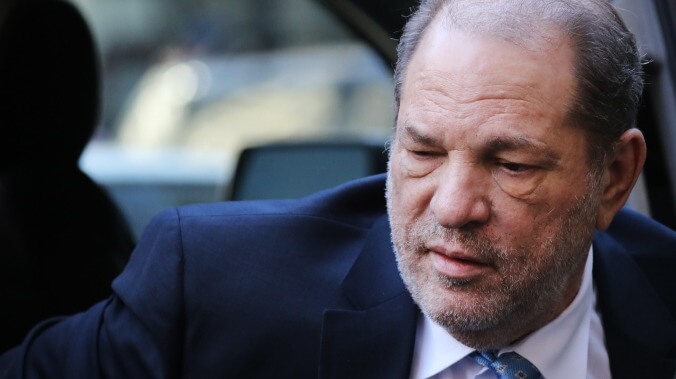Harvey Weinstein sentenced to 23 years in prison

Last month, disgraced movie mogul Harvey Weinstein was found guilty of a criminal sexual act in the first degree and rape in the third degree in New York. The verdict was delivered following more than a month’s worth of testimony from six women who accused the producer of predatory emotional and physical abuse, though the relevant criminal charges related to only two of them, Miriam Haley and Jessica Mann. Today, Judge James Burke sentenced Weinstein to 23 years in prison, with 20 years for the criminal sexual act charge and three for the rape charge. He’ll serve the sentences consecutively and will be formally registered as a sex offender.
Since the verdict was handed down, the 67-year old has spent time in New York City’s Bellevue Hospital, where he had a stent inserted due to heart issues, and imprisoned at Rikers Island, where he suffered a fall this past Sunday. Prior to the sentencing, his defense has cited these incidents as reasons why he should be given the lightest possible sentence of five years. “Given his age and specific medical risk factors, any additional term of imprisonment above the mandatory minimum—although the grave reality is that Mr. Weinstein may not even outlive that term—is likely to constitute a de facto life sentence,” his defense argued in a seven-page letter to Judge Burke. He arrived to the sentencing in a wheelchair.
The prosecution, meanwhile, argued that Weinstein should receive the maximum sentence of 29 years, citing 36 “prior bad acts.”
Weinstein spoke to the packed courthouse before the sentencing, saying that though he had “deep remorse,” he finds himself “totally confused” by the #MeToo movement. “I think men are confused about all of this…this feeling of thousands of men and women who are losing due process, I’m worried about this country,” he said. “This is not the right atmosphere in the United States of America.”
Weinstein’s attorney, Donna Rotunno, decried the sentence outside the courthouse. “Of course it’s too harsh. It’s ridiculous,” she said. “That number was obnoxious. There are murderers who will get out of court faster than Harvey Weinstein will. That number spoke to the pressure of movements in the public, that number did not speak to the evidence that came out in trial. That number did not speak to the testimony that we heard. That number did not speak to evidence, nor did it speak to justice.”
More than 100 women have accused Weinstein of sexual assault and harassment in the two and a half years since a pair of bombshell stories in the New York Times and the New Yorker exposed a long-running pattern of abusive, predatory, and retaliatory behavior from the movie mogul.
In December, he and the board of his bankrupt film studio settled with more than 30 accusers for $25 million. The deal did not, however, require Weinstein to admit any wrongdoing. The settlement money, meanwhile, would come not from Weinstein, but from insurers. According to the New York Times, $6.2 million would go to the 18 accusers who filed cases in the United States, Canada, and the United Kingdom. The rest is reserved for class-action participants and accusers who have yet to come forward.